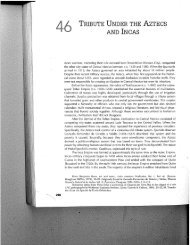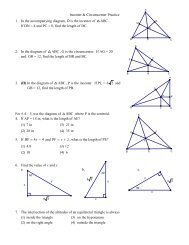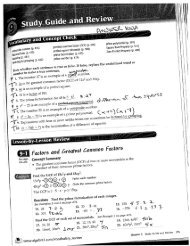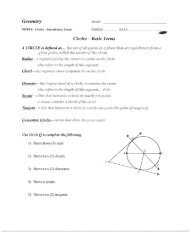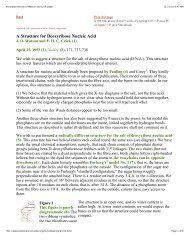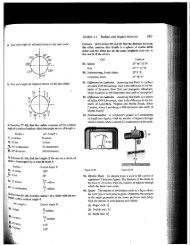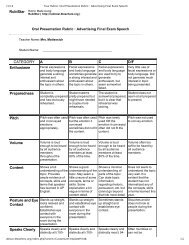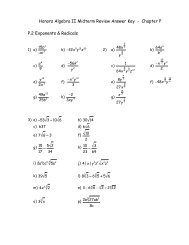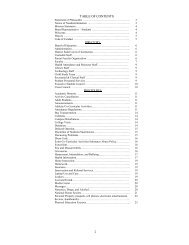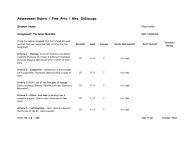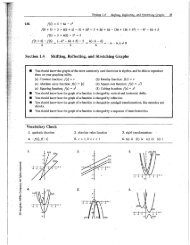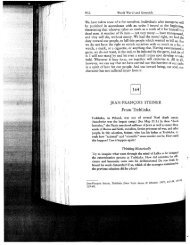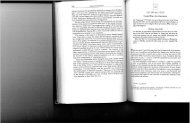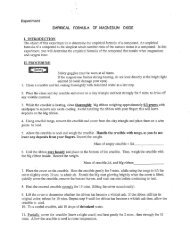work and workers in the industrial revolution - Pascack Valley ...
work and workers in the industrial revolution - Pascack Valley ...
work and workers in the industrial revolution - Pascack Valley ...
Create successful ePaper yourself
Turn your PDF publications into a flip-book with our unique Google optimized e-Paper software.
WORK AND WORKERSIN THE INDUSTRIAL REVOLUTIONThe Industrial Revolution was one of <strong>the</strong> great changes <strong>in</strong> Western <strong>and</strong> ultimately worldhistory. Tak<strong>in</strong>g shape toward <strong>the</strong> end of <strong>the</strong> 18th century <strong>in</strong> Great Brita<strong>in</strong>, <strong>in</strong>dustrializationdom<strong>in</strong>ated <strong>the</strong> 19th century <strong>in</strong> Western Europe <strong>and</strong> North America. Based on radicallynew technologies, <strong>in</strong>clud<strong>in</strong>g <strong>the</strong> use of fossil fuels for power, <strong>in</strong>dustrialization<strong>revolution</strong>ized <strong>the</strong> production <strong>and</strong> transport of goods. It susta<strong>in</strong>ed rapid populationgrowth <strong>in</strong> <strong>the</strong> West <strong>and</strong> created grow<strong>in</strong>g material abundance as well. This <strong>in</strong>dustrializationtransformed a social structure once based on <strong>the</strong> l<strong>and</strong> <strong>in</strong>to divisions based on urbanwealth <strong>and</strong> property. It fostered large organizations <strong>and</strong> a grow<strong>in</strong>g state capable of us<strong>in</strong>gnew technologies of communication <strong>and</strong> marshal<strong>in</strong>g large amounts of capital <strong>and</strong> largenumbers of goods <strong>and</strong> people. It challenged family life by tak<strong>in</strong>g <strong>work</strong> out of <strong>the</strong> home "<strong>and</strong> redef<strong>in</strong><strong>in</strong>g <strong>the</strong> roles of many women <strong>and</strong> children, it was, <strong>in</strong> sum, as basic a change<strong>in</strong> human history as had occurred s<strong>in</strong>ce <strong>the</strong> advent of settled agriculture.One of <strong>the</strong> many areas altered by <strong>in</strong>dustrialization was <strong>the</strong> nature of <strong>work</strong>, particularlyfor those people who labored <strong>in</strong> <strong>the</strong> proliferat<strong>in</strong>g m<strong>in</strong>es <strong>and</strong> factories. Some featuresof <strong>in</strong>dustrializa~tion benefited <strong>work</strong>: mach<strong>in</strong>es could lighten labor, factories could providesocial stimulation, <strong>and</strong> some jobs that dem<strong>and</strong>ed new technical expertise becameunusually <strong>in</strong>terest<strong>in</strong>g. But many <strong>work</strong>ers found <strong>in</strong>dustrial <strong>work</strong><strong>in</strong>g conditions a stra<strong>in</strong>because <strong>the</strong>y challenged a number of traditional values <strong>and</strong> habits. Certa<strong>in</strong>ly, changes <strong>in</strong><strong>work</strong> provide one way of measur<strong>in</strong>g <strong>the</strong> human impact of <strong>the</strong> vast <strong>in</strong>dustrializationprocess--some would say, of measur<strong>in</strong>g human degradation.The selections focus on three aspects of <strong>in</strong>dustrial <strong>work</strong> dur<strong>in</strong>g <strong>the</strong> 19th century.The first document comes from a parliamentary <strong>in</strong>quiry on child labor, conducted <strong>in</strong>Brita<strong>in</strong> <strong>in</strong> <strong>the</strong> early 1830s <strong>and</strong> ultimately <strong>the</strong> source of laws restrict<strong>in</strong>g child labor. Childlabor was not <strong>in</strong> fact new, so one question to ask is what aspects of <strong>the</strong> factory systemmade it seem newly shock<strong>in</strong>g. A second, related feature of <strong>in</strong>dustrial <strong>work</strong>--<strong>and</strong> one thatpersisted far longer than child labor--was <strong>the</strong> attempt to br<strong>in</strong>g new discipl<strong>in</strong>e to <strong>the</strong> laborforce. In <strong>the</strong> second document, shop rules--<strong>in</strong> this case, from a French factory <strong>in</strong> <strong>the</strong> late1840s~did battle with a number of customary impulses <strong>in</strong> an effort to make <strong>work</strong> morepredictable <strong>and</strong> less casual. F<strong>in</strong>ally, new <strong>work</strong><strong>in</strong>g conditions provoked direct comment by<strong>work</strong>ers through protest <strong>and</strong> <strong>in</strong>dividual statements. The comment offered <strong>in</strong> <strong>the</strong> third document,by an unusually sensitive German m<strong>in</strong>er around 1900--among o<strong>the</strong>r th<strong>in</strong>gs, an136Selection I fxoi~ British Sessional Papers, 1831-1832, House of Commons, Vol. XV, pp. 17-19.Selection II ~rora The A*’chive~ du Haut Rh<strong>in</strong> IMI123C1, translated by Peter N. Stearns. Selection IIIfrom Adolf Levenste<strong>in</strong>, Aus Der Tief, Arbeitgrbfiefe, trans, by Gabrlela Wettber t (Berli~a: !905), pp. 48, 57, 60.
Chapter 18 1 Work <strong>and</strong>Workers <strong>in</strong> <strong>the</strong> Industrial Revolution1373Nardent socialist--is not typical, but it does express some widely shared grievances. Allthree documents suggest <strong>the</strong> tensions that changes <strong>in</strong> <strong>work</strong> could br<strong>in</strong>g. A basic feature ofWestern life <strong>in</strong> <strong>the</strong> 19th century, this stra<strong>in</strong> spread with <strong>in</strong>dustrialization to o<strong>the</strong>r societieslater. How could <strong>work</strong>ers modify or adapt to new <strong>work</strong> habits? How might changes <strong>in</strong><strong>work</strong> affect o<strong>the</strong>r aspects of <strong>the</strong>ir lives, <strong>in</strong> <strong>the</strong> family, politics, or culture?The Industrial Revolution was, at first, a European phenomenon, but it hadglobal connections <strong>and</strong> consequences from <strong>the</strong> outset. New <strong>work</strong> styles <strong>in</strong> factories<strong>and</strong> m<strong>in</strong>es could easily ",affect <strong>work</strong> <strong>in</strong> o<strong>the</strong>r regions; <strong>the</strong>y also set patterns thatmight recur when <strong>in</strong>dustrialization itself spread to o<strong>the</strong>r regions.y worldtrializa-~n radilization)ulationIrializa-~ urban)f us<strong>in</strong>g,d large~ homechange~ar~icu-~atures[d proecamestra<strong>in</strong>~ges <strong>in</strong>zation~ntury.ted <strong>in</strong>Child~ystem!e thatlaborie late~nt by!doc-INDUSTRIAL REVOLUTION DOCUMENTSI. BRITISH CHILD LABOR INQUIRY (1831-1832)Mr. Abraham Whitehead431. What is your bus<strong>in</strong>ess?--A clothier.43";’. Where do you reside?--At Scholes, near Holmfirth.433. Is not that <strong>in</strong> <strong>the</strong> centre of very considerable woollen mills? Yes, for a spaceof three or four miles; I live nearly <strong>in</strong> <strong>the</strong> centre of thirty or forty woollen mills ....436. Are <strong>the</strong>re children <strong>and</strong> young persons of both sexes employed <strong>in</strong> <strong>the</strong>semills?--Yes.437. At how early an age are children employed?--The youngest age at whichchildren are employed is never under five, but some are employed between five<strong>and</strong> six <strong>in</strong> woollen mills at piec<strong>in</strong>g.438. How early have you observed <strong>the</strong>se young children go<strong>in</strong>g to <strong>the</strong>ir <strong>work</strong>,speak<strong>in</strong>g for <strong>the</strong> present <strong>in</strong> <strong>the</strong> summer th,ne?--In <strong>the</strong> summer time I have frequentlyseen <strong>the</strong>m go<strong>in</strong>g to <strong>work</strong> between five <strong>and</strong> six <strong>in</strong> <strong>the</strong> morn<strong>in</strong>g, <strong>and</strong> I know<strong>the</strong> general practice is for <strong>the</strong>m to go as early to all <strong>the</strong> mills ....439. How late <strong>in</strong> <strong>the</strong> even<strong>in</strong>g have you seen <strong>the</strong>m at <strong>work</strong>, or remarked <strong>the</strong>mreturn<strong>in</strong>g to <strong>the</strong>ir homes?--I have seen <strong>the</strong>m at <strong>work</strong> <strong>in</strong> <strong>the</strong> summer seasonbetween n<strong>in</strong>e <strong>and</strong> ten <strong>in</strong> <strong>the</strong> even<strong>in</strong>g; <strong>the</strong>y cont<strong>in</strong>ue to <strong>work</strong> as long as <strong>the</strong>y can see,<strong>and</strong> <strong>the</strong>y can see to <strong>work</strong> <strong>in</strong> <strong>the</strong>se mills as long as you could see to read ....441. You say that on your own personal knowledge?--I live near to parentswho have been send<strong>in</strong>g <strong>the</strong>ir children to mills fbr a great number of years, <strong>and</strong> Iknow positively that <strong>the</strong>se children are every morn<strong>in</strong>g <strong>in</strong> <strong>the</strong> w<strong>in</strong>ter seasons calledout of bed between five <strong>and</strong> six, <strong>and</strong> <strong>in</strong> some <strong>in</strong>stances between fbur <strong>and</strong> five.442. Your bus<strong>in</strong>ess as a clothier has often led you <strong>in</strong>to <strong>the</strong>se mills?--Frequendy....460. What has been <strong>the</strong> treatment which you have’observed that <strong>the</strong>se childrenreceived at <strong>the</strong> mills, to keep <strong>the</strong>m attentive for so many hours at such earlyages?--They are generally cruelly treated; so cruelly treated, that <strong>the</strong>y dare notMy heart has been
I "~8 Sec~cion Two / The Long ~9th Century: ~750-1914ready to bleed for <strong>the</strong>m when i have seen <strong>the</strong>m so fatigued, for <strong>the</strong>y appear <strong>in</strong> sncha state of apathy <strong>and</strong> <strong>in</strong>sensibility as really not to know whe<strong>the</strong>r <strong>the</strong>y are do<strong>in</strong>g <strong>the</strong>ir<strong>work</strong> or not ....461. Do <strong>the</strong>y frequently thll <strong>in</strong>to errors <strong>and</strong> mistakes <strong>in</strong> piec<strong>in</strong>g when thusfatigued?--Yes; <strong>the</strong> errors <strong>the</strong>y make when thus fadgued are, that <strong>in</strong>stead of plac<strong>in</strong>g<strong>the</strong> cord<strong>in</strong>g <strong>in</strong> this way [describ<strong>in</strong>g it], <strong>the</strong>y are apt.to place <strong>the</strong>m obliquely, <strong>and</strong>that canses a fly<strong>in</strong>g, which makes bad yarn; <strong>and</strong> when <strong>the</strong> billy-sp<strong>in</strong>ner sees that, hetakes his strap or <strong>the</strong> billy-roller, <strong>and</strong> says, "Damn <strong>the</strong>e, close it, little devil, close it,"<strong>and</strong> <strong>the</strong>y smite <strong>the</strong> child with <strong>the</strong> strap or <strong>the</strong> billy-roller....510. You say that <strong>the</strong> morals of <strong>the</strong> children are very bad when conf<strong>in</strong>ed <strong>in</strong><strong>the</strong>se mills; what do you consider to be <strong>the</strong> situation of children who have noth<strong>in</strong>gto do, <strong>and</strong> are runn<strong>in</strong>g about such towns as Leeds, with no employment to keep<strong>the</strong>m out of mischief?--Children that are not employed <strong>in</strong> ~nills are generally moremoral <strong>and</strong> better behaved than children who are employed <strong>in</strong> mills.511. Those <strong>in</strong> perfect idleness are better behaved than those that areemployed?--That is not a common th<strong>in</strong>g; <strong>the</strong>y ei<strong>the</strong>r employ <strong>the</strong>m <strong>in</strong> some k<strong>in</strong>d ofbus<strong>in</strong>ess at home, or send <strong>the</strong>m to sdhoo!.512. Are <strong>the</strong>re no day-schools to which <strong>the</strong>se factory children go?--They haveno opportunity of go<strong>in</strong>g to school when <strong>the</strong>y are thus employed at <strong>the</strong> rai!!.II. RULES FOR WORKERS IN THE FACTORY OF BENCK AND CO.IN B~IHL, ALSACE (1842)Article 1. Every <strong>work</strong>er who accepts employment <strong>in</strong> any <strong>work</strong>-site is obligated toread <strong>the</strong>se rules <strong>and</strong> to submit to <strong>the</strong>m. No one should be unfamiliar with <strong>the</strong>m. If<strong>the</strong> rules are violated <strong>in</strong> any <strong>work</strong>-site, <strong>the</strong> offenders must pay.f<strong>in</strong>es accord<strong>in</strong>g to <strong>the</strong>disorder or damage <strong>the</strong>y have caused.Art. 2. All <strong>work</strong>ers without exception are obligated, after <strong>the</strong>y have <strong>work</strong>ed <strong>in</strong><strong>the</strong> factory for fourteen days, to gi~e a month’s notice when <strong>the</strong>y wish to quit. Thisprovision can be waived only for important reasons.Art. 3. The <strong>work</strong> day will consist of twelve hours, without count<strong>in</strong>g rest periods.Children under twelve are excepted; <strong>the</strong>y have to <strong>work</strong> only eight hours a day.A~’t. 4. The bell denotes <strong>the</strong> hours of entry <strong>and</strong> departure <strong>in</strong> <strong>the</strong> factory whenit first r<strong>in</strong>gs. At <strong>the</strong> second r<strong>in</strong>g every <strong>work</strong>er should be at his <strong>work</strong>. At quitt<strong>in</strong>g time<strong>the</strong> bell will also be sounded when each <strong>work</strong>er should clean his <strong>work</strong>place <strong>and</strong> hismach<strong>in</strong>e (if he has one). It is forbidden under penalty of f<strong>in</strong>es to ab<strong>and</strong>on <strong>the</strong><strong>work</strong>place before <strong>the</strong> bell <strong>in</strong>dicates that <strong>the</strong> <strong>work</strong>-site is closed.Art. 5. It is forbidden to smoke tobacco <strong>in</strong>side <strong>the</strong> factory. Whoever violatesthis prohibition is subjected to a heavy f<strong>in</strong>e <strong>and</strong> can be dismissed. It is also forbiddenunder penalty of f<strong>in</strong>es to br<strong>in</strong>g beer or bran@ <strong>in</strong>to <strong>the</strong> factory. Any <strong>work</strong>erwho comes to <strong>the</strong> factory drunk will be sent away <strong>and</strong> f<strong>in</strong>ed.Art. 6. The porter, whoever he may be, is forbidden to admit anyone after<strong>the</strong> <strong>work</strong>day beg<strong>in</strong>s. If someone asks for a <strong>work</strong>er he will make him wait <strong>and</strong> have<strong>the</strong> <strong>work</strong>er called. All <strong>work</strong>ers are forbidden to br<strong>in</strong>g anyone <strong>in</strong>to <strong>the</strong> factory<strong>and</strong> <strong>the</strong> porter is fbrbidden to admit anyone. The porter is also fbrbidden tolet any <strong>work</strong>ers <strong>in</strong> or out without <strong>the</strong> foreman’s permission dur<strong>in</strong>g <strong>the</strong> hoursof <strong>work</strong>.
<strong>in</strong> such<strong>in</strong>g <strong>the</strong>ir~en thusf plac<strong>in</strong>grely, <strong>and</strong>that, heclose it,"f<strong>in</strong>ed <strong>in</strong>noth<strong>in</strong>gto keepllv more;hat arek<strong>in</strong>d oftey have,~ated to:hem. Ifg to <strong>the</strong>rked <strong>in</strong>tit. This:st peri--s a dayy whenag time<strong>and</strong> hislon <strong>the</strong>~olatesforbid<strong>work</strong>ere afterid havefactoryden tohoursChapter 18 / Work <strong>and</strong>Workers <strong>in</strong> <strong>the</strong> Industrial RevolutionArt. 7. Any <strong>work</strong>er who misses a day without <strong>the</strong> Director’s permission mustpay a f<strong>in</strong>e of two francs. The f<strong>in</strong>e is doubled tbr a second offense. Any <strong>work</strong>er whois absent several times is dismissed, <strong>and</strong> if he is a weaver he is not paid for any piecehe may have begun unless he can prove he missed <strong>work</strong> because of illness <strong>and</strong>should <strong>the</strong>refore be paid fur <strong>work</strong> he has already done.Art. 8. All <strong>work</strong>ers <strong>in</strong> <strong>the</strong> factory are obligated to be members of <strong>the</strong> SicknessFund, to pay <strong>the</strong>ir dues, <strong>and</strong> conduct <strong>the</strong>mselves accord<strong>in</strong>g to its statutes.Art. 9. The foreman <strong>and</strong> <strong>the</strong> porter ar~e empowered to reta<strong>in</strong> any <strong>work</strong>er leav<strong>in</strong>g<strong>the</strong> factory <strong>and</strong> to search him, as often as <strong>the</strong> <strong>in</strong>terests of <strong>the</strong> Director mayreqnire. It is also recommended to <strong>the</strong> foreman to close <strong>the</strong> <strong>work</strong>-site himself, give<strong>the</strong> key to <strong>the</strong> porter, <strong>and</strong> to al!ow no <strong>work</strong>er <strong>in</strong>side dur<strong>in</strong>g meal periods.Art. 10. Workers should only go <strong>in</strong> <strong>and</strong> out of doors where a porter resides, else<strong>the</strong>y will be f<strong>in</strong>ed, brought under suspicion, <strong>and</strong> dismissed. They cannot refuse to surrenderany of <strong>the</strong>ir belong<strong>in</strong>gs at <strong>work</strong>, for which <strong>the</strong>y wil! be reimbursed accord<strong>in</strong>gto <strong>the</strong> valuation of <strong>the</strong> Director <strong>and</strong> <strong>the</strong> tbreman. Workers are also ordered to be obedientto <strong>the</strong> foreman, who is fully empowered by <strong>the</strong> Director. Any disobedience willbe punished by f<strong>in</strong>es accord<strong>in</strong>g to <strong>the</strong> importance of tire case. Any offender is responsiblefor <strong>the</strong> consequences of his action. It is also forbidden for any <strong>work</strong>er to seek<strong>work</strong> <strong>in</strong> any of <strong>the</strong> company’s <strong>work</strong>-sites o<strong>the</strong>r than <strong>the</strong> one <strong>in</strong> which he is employed;anyone encountered <strong>in</strong> ano<strong>the</strong>r <strong>work</strong>-site will be punished.At’t. !1. Every <strong>work</strong>er is personally responsible tbr <strong>the</strong> objects entrusted tohim. Any object that cannot be produced at <strong>the</strong> first request must be paid fo~:Weavers are obligated to pay carefnl attention ~o <strong>the</strong>ir cloth when <strong>the</strong>y dry it. Theywill be f<strong>in</strong>ed <strong>and</strong> held responsible for any damage.Art. 19. In return for <strong>the</strong> protection <strong>and</strong> care which al! <strong>work</strong>ers can expectfrom <strong>the</strong> Director, <strong>the</strong>y pledge to him loyalty <strong>and</strong> attachment. They promiseimmediately to call to his attention anyth<strong>in</strong>g that threatens good order or <strong>the</strong>Director’s <strong>in</strong>terests. Workers are also put qn notice that any untbrtunate whocommits a <strong>the</strong>ft, however small it may be, will be taken to court <strong>and</strong> ab<strong>and</strong>onedto his fate.III. MAX LOTZ, A GERMAN MINER, DESCRIBES HIS WORK(CA. 1900)A trembl<strong>in</strong>g of <strong>the</strong> pupils fbrms <strong>in</strong> <strong>the</strong> eyes of many m<strong>in</strong>ers. At first it is not noticeablebut it gradually becomes stronger. Where this eye ailment reaches a certa<strong>in</strong>stage <strong>the</strong> stricken person becomes unable to <strong>work</strong> <strong>in</strong> <strong>the</strong> pit any longm: Thestricken man becomes unsure of his grip, he often misses <strong>the</strong> desired object by onefoot. He has particular difficulties <strong>in</strong> direct<strong>in</strong>g his glance upward. If he fixes butbarely on an object his eyes beg<strong>in</strong> to tremble immediately. But this calamity onlyappears <strong>in</strong> <strong>the</strong> m<strong>in</strong>e or <strong>in</strong> artificial light. Above ground <strong>and</strong> <strong>in</strong> daylight it is neverpresent. I know a laborer <strong>work</strong><strong>in</strong>g quite close to me who takes a quart of liquordaily <strong>in</strong>to <strong>the</strong> shaft. As soon as <strong>the</strong> trembl<strong>in</strong>g beg<strong>in</strong>s he takes a sip <strong>and</strong> <strong>the</strong> pupilbecomes calm for a short while--so he states. Thus one can become a habitualdrunk, too.But this is not all. Almost all m<strong>in</strong>ers are anemic. I do not know what causesthis pathological dim<strong>in</strong>ution of blood corpuscles <strong>in</strong> m<strong>in</strong>ers, whe<strong>the</strong>r this resnlts139
140 SectionTwo ! The Long 19th Century: 1750M914from a general lack of prote<strong>in</strong> <strong>in</strong> <strong>the</strong> blood. I suppose that it is caused ma<strong>in</strong>ly by <strong>the</strong>long, daily stay <strong>in</strong> bad air comb<strong>in</strong>ed with <strong>the</strong> absence of sun or day light. I reasonthat if one places a potted plant <strong>in</strong> a warm but dark cellar for a long time it willgrow significantly more pale <strong>and</strong> sickly than her beautifully scent<strong>in</strong>g sisters <strong>in</strong> <strong>the</strong>rose-colored sunlight. It must be like this ibr <strong>the</strong> drudges down <strong>the</strong>re. Anemia renders<strong>the</strong> m<strong>in</strong>er characteristically pale ....Let’s go, shouted Prfifer, who had already picked up a shovel. Four morewagons have to fall. It is almost 12:30 [p.m.] now. All right, I agreed, <strong>and</strong> we swung<strong>the</strong> shovels.Away it goes, comm<strong>and</strong>ed Bittner when <strong>the</strong> wagons were fully loaded. Jumpto it, <strong>the</strong>re is plenty of coal. Well, if I were a pickman, mumbled <strong>the</strong> chief pickman<strong>the</strong>n I’d have myself a dr<strong>in</strong>k. And he brea<strong>the</strong>d heavily beh<strong>in</strong>d <strong>the</strong> wagon.Let’s set up <strong>the</strong> plank<strong>in</strong>g until Rhe<strong>in</strong>hold comes back so that th<strong>in</strong>gs don’tlook so scruffy, I said to Bitmer even though we would ra<strong>the</strong>r have stretched out on<strong>the</strong> pile of coal because we were so tired.He replied: I don’t care, but first I want to wr<strong>in</strong>g out my trousers. And st<strong>and</strong><strong>in</strong>g<strong>the</strong>re naked he started to squeeze <strong>the</strong> water from <strong>the</strong> garment. I followed hisexample. When we had f<strong>in</strong>ished, it looked around us as though a bucket full ofwater had been spilled. I do not exaggerate. In o<strong>the</strong>r locations where it was warmeryet, <strong>the</strong> <strong>work</strong>ers were forced to undergo this procedure several times dur<strong>in</strong>g <strong>the</strong>ir<strong>work</strong><strong>in</strong>g hours. But let us rema<strong>in</strong> here.We put our undergarments back on <strong>and</strong> did not pay attention to <strong>the</strong> unpleas-.ant feel<strong>in</strong>g which we had do<strong>in</strong>g so. We placed <strong>the</strong> wooden planks <strong>and</strong> cleared aside<strong>the</strong> debris <strong>in</strong> order to establish good <strong>work</strong><strong>in</strong>g conditions for <strong>the</strong> o<strong>the</strong>r third whichusually did not do <strong>the</strong> same for us--because <strong>the</strong>y were too fatigued.The <strong>work</strong> is becom<strong>in</strong>g <strong>in</strong>creas<strong>in</strong>gly mechanical. No more <strong>in</strong>centive, no morehaste, we muddle along wearily, we are worn out <strong>and</strong> m<strong>in</strong>dless. There was sufficientcoal, Rhe<strong>in</strong>ho!d could come at any time. My forehead burned like fire. As a consequenceof <strong>the</strong> anemia from which°I suffer I occasionally experience a slight dizzyspell. Bittner does not know about it. But <strong>in</strong> my head it rages <strong>and</strong> paralyzes mebeyond control or without my be<strong>in</strong>g able to th<strong>in</strong>k. When it becomes unbearable Istop my slow, phlegmatic <strong>and</strong> energyless <strong>work</strong><strong>in</strong>g. I <strong>the</strong>n sit on <strong>the</strong> side wall of <strong>the</strong>mounta<strong>in</strong> <strong>in</strong> order to slurp <strong>the</strong> last rema<strong>in</strong><strong>in</strong>g coffee ....This is a brief description of one shift <strong>in</strong> <strong>the</strong> pit. And this torture, this <strong>in</strong>humanhaste repeats itself day after day [so] that <strong>the</strong> various states of exhaustionexpress <strong>the</strong>mselves mildly or very pronouncedly <strong>in</strong> <strong>the</strong> physical state of <strong>the</strong> <strong>in</strong>dividuals.And that is not all; <strong>the</strong> spirit, too, <strong>the</strong> conscience of <strong>the</strong> <strong>in</strong>dividual degenerates.And one drudge, grown vacuous through his <strong>work</strong>, is put beside ano<strong>the</strong>r one,<strong>and</strong> ano<strong>the</strong>r one <strong>and</strong> f<strong>in</strong>ally this "modern" circle has closed <strong>in</strong> on <strong>the</strong> endre <strong>work</strong><strong>in</strong>gforce. And he who says that primarily <strong>the</strong> professional group of <strong>the</strong> m<strong>in</strong>ers is<strong>the</strong> rudest, least educated <strong>and</strong> spiritually lowest class of men does not lie. Ofcourse, <strong>the</strong>re are exceptions here, too. But <strong>the</strong>se exceptions are supposed to validate<strong>the</strong> rule accord<strong>in</strong>g to a simple type of logic. In any event, it truly takes spiritualmagnitude to occupy still oneself with belletristic, scientific <strong>and</strong> thought-provok<strong>in</strong>gmaterials after a completed shift. When I come home <strong>in</strong> that condition I still haveto cope with o<strong>the</strong>r necessary heavy <strong>work</strong> around <strong>the</strong> house. And f<strong>in</strong>ally <strong>the</strong>re onlyrema<strong>in</strong>s <strong>the</strong> even<strong>in</strong>g hours for <strong>the</strong> writ<strong>in</strong>g tasks which I deem noble.
Chapter 18 / Work <strong>and</strong>Workers <strong>in</strong> <strong>the</strong> Industrial RevoIution141lly by <strong>the</strong>I reasonne it will:rs <strong>in</strong> <strong>the</strong>~mia renswung~d. Jumppickmangs don’td out ond st<strong>and</strong>-~wed hist full ofwarmerng <strong>the</strong>ir~npleas-~d asided whichmorelfficientSTUDY QUESTIONS1. What features of child labor seemed newly objectionable <strong>in</strong> <strong>the</strong> context of factory<strong>in</strong>dustry?2. What were <strong>the</strong> ma<strong>in</strong> goals of factory <strong>work</strong> rules? What problems did <strong>the</strong>yaddress? What <strong>in</strong>novations did <strong>the</strong>y particularly suggest, compared with moretraditional <strong>work</strong> patterns?3. What does Max Lotz see as <strong>the</strong> primary problems of m<strong>in</strong>e <strong>work</strong>? Were <strong>work</strong>conditions gett<strong>in</strong>g better or worse by 1900 <strong>in</strong> highly <strong>in</strong>dustrialized societies likeGermany? Why might some <strong>work</strong>ers disagree with Lotz’s assessment?4. Do problems of <strong>work</strong> <strong>in</strong> 19th-cenmry Europe suggest that <strong>in</strong>dustrializationdeteriorated <strong>the</strong> quality of human life? What o<strong>the</strong>r t~ctors need m be taken<strong>in</strong>to account? How did <strong>work</strong>ers <strong>and</strong> o<strong>the</strong>rs deal with <strong>the</strong> issues identified <strong>in</strong><strong>the</strong>se documents?ESSAY SUGGESTIONSA. How did European factory conditions relate to <strong>work</strong><strong>in</strong>g conditions <strong>in</strong> o<strong>the</strong>rparts of <strong>the</strong> world dur<strong>in</strong>g <strong>the</strong> 19th century? -vV~mt were o<strong>the</strong>r major changes <strong>in</strong><strong>work</strong> systems dur<strong>in</strong>g <strong>the</strong> period, <strong>and</strong> how did <strong>the</strong>y relate to <strong>in</strong>dustrial st<strong>and</strong>ards?B. Did similar changes <strong>in</strong> <strong>work</strong> occur when <strong>in</strong>dustrialization spread to o<strong>the</strong>rcounties, from <strong>the</strong> later 19th century until today? What connections might beexpected, <strong>and</strong> what <strong>in</strong>formation would be particularly important <strong>in</strong> determ<strong>in</strong><strong>in</strong>ghow similar or different recent <strong>in</strong>dustrial conditions have been to earlierEuropean patterns?dizzywable Iof <strong>the</strong>is <strong>in</strong>hu-~mstionndivid-~genererone,~ <strong>work</strong>hersisfie. Ofto vafi-~iritualyok<strong>in</strong>g!1 have~ only



